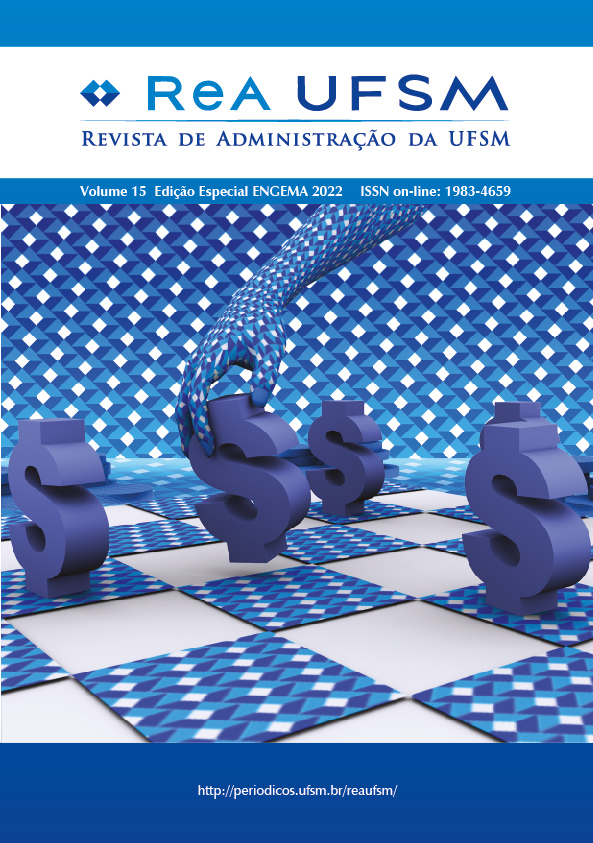Sustainable consumption in the clothing segment: a comparative study between Brazilians and Germans
DOI:
https://doi.org/10.5902/1983465969147Schlagworte:
Consumer behavior, Sustainable consumption, Clothing, Brazil, GermanyAbstract
Objective – To Analyze and compare sustainable consumption habits in the clothing segment between Brazilians and Germans.
Design/methodology/approach– Descriptive, exploratory, and qualitative research. Interviews were conducted with 15 Germans and 15 Brazilians, aged between 20 and 32 years old, in order to identify consumption habits in the clothing segment, familiarity with the theme: sustainable consumption , and levels of personal awareness regarding their consumption behavior, applying the content analysis based on Bardin (2011) as a technique.
Findings – A significant difference between the two groups was found. While Germans presented greater knowledge on the subject, which was converted into embracing sustainable conduct in the clothing segment, Brazilians demonstrated to have a more superficial knowledge, besides presenting lower levels of awareness in their consumption and sustainable practices in the analyzed segment. Therefore, it concludes that Germans have greater access to information on the theme and more interest and familiarity with the subject. Consequently, it showed that it influences their consumption behavior, presenting habits towards environmental, social, and economic concerns in the clothing segment, habits that were not identified in the Brazilian sample group.
Originality/value (mandatory) – It contributes by providing an opportunity to comparatively analyze the habits and consumption of two distinct countries, helping entrepreneurs and managers to understand the market segments better and create more powerful strategies, focusing on the value perceived by the customer in the acts of consumption.
Downloads
Literaturhinweise
Alves, R. R. (2016). Administração verde: o caminho sem volta da sustentabilidade ambiental nas organizações. 1.ed. Rio de Janeiro: Elsevier.
Bardin, L. (2011). Análise de conteúdo. São Paulo: Edições 70.
Barros, A. J. P.; & Lehfeld, N. A. S. (2000). Projeto de pesquisa: propostas metodológicas. Petrópolis: Vozes.
Beck, D. Q.; Henning, P. C.; & Vieira, V. T. (2014). Consumo e cultura: Modos de ser e viver a contemporaneidade.
Caetano, C. (2013). O cross-branding e a cocriação no âmbito do varejo de moda. São Paulo: Universidade de São Paulo.
Akatu. (2005). Consumo e Sustentabilidade. Disponível em: <https://www.akatu.org.br/noticia/consumo-e-sustentabilidade-2/>. Acesso em: 29 mai. 2021.
D'angelo, A. (2003). Cultura e Consumo: Apanhado Teórico e Reflexões para o Ensino e a Pesquisa de Marketing e Administração. Disponível em: <http://www.anpad.org.br/admin/pdf/enanpad2003-mkt-0409.pdf>. Acesso em: 06 jun. 2021.
Dias, R. (2017). Gestão ambiental: responsabilidade social e sustentabilidade. 3. ed. Rio de Janeiro: Atlas.
Fabri, H. P.; & Rodrigues, L. V. (2015). Slow fashion: perspectivas para um futuro sustentável. 2º congresso brasileiro de iniciação científica em design e moda. Anais... Paraná.
Fletcher, K.; & Grose, L. (2011). Moda e sustentabilidade: design para a mudança. São paulo: Senac.
Gardetti, M. A.; & Torres. A. L. (2013). Sustainability in Fashion and Textiles: Values, Design, Production and Consumption. Buenos Aires: Greenleaf Publishing.
Gardetti, M. A.; & Torres, A. L. (2013). The Sustainable Textile Centre. Argentina: Greenleaf Publishing.
Gil, A. C. (2010). Como elaborar projetos de pesquisa. São Paulo: Atlas.
Hall, E. T. (1979). Beyond Culture. Nova Iorque: Doubleday.
Lee, M. (2009). Eco Chic. São Paulo: Larousse.
Malhotra, N. K. (2012). Pesquisa de Marketing: uma orientação aplicada. Porto Alegre: Bookman.
Mccracken, G. (1988). Culture and consumption: new approaches to the symbolic character of consumer goods and activities. Bloomington: Universidade de Indiana.
Mccracken, G. (2007). Cultura e consumo: uma explicação teórica da estrutura e do movimento do significado cultural dos bens de consumo. Boston: Harvard Business School.
Moreira, L. F. (2015). A revalorização do movimento slow fashion visando o consumo sustentável. Porto Alegre: UniRitter.
Morgado, A. C. (2014). As múltiplas concepções da cultura in: Múltiplos Olhares em Ciência da Informação. 4. ed. Disponível em: <http://portaldeperiodicos.eci.ufmg.br/index.php/moci/article/view/2333/1544>. Acesso em: 04 jun. 2021.
Mori, N. T. (2016). Slow Fashion: conscientização do consumo de moda no Brasil. São Paulo: Escola de Comunicações e Artes.
Ministério do Meio Ambiente. (2011). O que é consumo sustentável. Disponível em: <http://www.mma.gov.br/responsabilidade-socioambiental/producao-e-consumo-sustentavel/conceitos/consumo-sustentavel.html>. Acesso em: 29 mai. 2021.
Prodanov, C. C.; & Freitas, E. C. (2013). Metodologia do Trabalho Científico: Métodos e Técnicas da Pesquisa e do Trabalho Acadêmico. 2. ed. Rio Grande do Sul: Universidade Feevale.
Ribeiro, L. (2015). Marketing social e comportamento do consumidor. São Paulo: Pearson.
Sahlins, M. (1976). Culture and Practical Reason. Chicago: Universidade de Chicago.
Santos, W.; & Sá, A. J. (2009). Avalanche do consumismo na modernidade. Uma sociedade sem limites no mundo globalizado. Revista de geografia. Recife – UFPE – DCG/NAPA, 26 (3).
Shavitt, S.; Lee, A.; & Johnson, T. (2008). Cross-cultural consumer psychology. In.: Haugtvedt, C. P.; Herr; & Kardes, F. (Ed.), Handbook of consumer psychology, p. 1103–1131, Mahwah, Erlbaum.
Shimamura, E.; & Sanches, M. C. F (2012). O Fast Fashion e a identidade de marca. Projética Revista Científica de Design. Londrina, 3(2).
The true cost. (2015). Direção: Andrew Morgan. Estados Unidos: Untold Creative. 92 minutos.
Downloads
Veröffentlicht
Zitationsvorschlag
Ausgabe
Rubrik
Lizenz
Copyright (c) 2022 Revista de Administração da UFSM

Dieses Werk steht unter der Lizenz Creative Commons Namensnennung 4.0 International.
Until 2023, copyright was transferred by the authors to ReA/UFSM. As of 2024, the authors of articles published by the journal retain the copyright to their work. ReA/UFSM operates under a Creative Commons Attribution 4.0 International License (CC BY 4.0), which permits unrestricted reuse and distribution of articles, provided the original work is properly cited.






